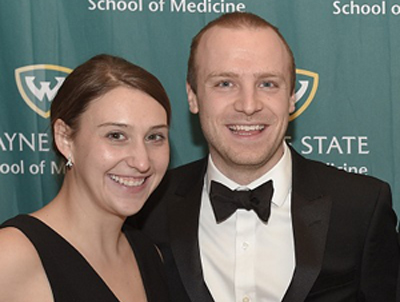
Donovan Watza, at right, with wife Courtney Watza, M.D. '17.
The National Cancer Institute's Division of Cancer Control and Population Sciences featured a research publication that includes work by Wayne State University School of Medicine M.D.-Ph.D. student Donovan Watza in its Epidemiology and Genomics Research Program's Research Highlights of 2018.
"Prognostic Modeling of the Immune-Centric Transcriptome Reveals Interleukin Signaling Candidates Contributing to Differential Patient Outcomes" was published in the Dec. 31, 2018, issue of the journal Carcinogenesis.
Watza, the lead author of the publication, is in his third year of doctoral studies within the school's Cancer Biology Graduate Program. He is mentored by Professor of Oncology Ann Schwartz, Ph.D., M.P.H., deputy center director and executive vice president for Research and Academic Affairs at the Barbara Ann Karmanos Cancer Institute.
"This is an outstanding achievement, with selection based on papers submitted from all NCI's Epidemiology and Genomics Research Program grant awardees.
Donovan is an exceptional student and is deserving of this national recognition. He conceived of and conducted this work, building on an NCI-funded study of mine and an appreciation of advances in the clinic," Dr. Schwartz said. "With Donovan's strong genomics background, his training within the MD program, in the Cancer Biology Program and in epidemiology provided the framework for him to study the role of immune pathways in lung cancer outcomes. He is a star within the Cancer Biology Program and will be a shining example of a clinician scientist as he completes his training."
His research in Dr. Schwartz's lab focuses on understanding the genetic and genomic features of lung tumors that predispose patients for differential outcomes to identify candidates for therapeutic intervention. He was a 2017-2018 Ruth L. Kirschstein Research Training Recipient (T32-CA009531).
"Immunotherapy is being widely adopted as the mainstay of therapy in advanced stage lung cancer, a disease that is the leading cause of cancer mortality in the United States and across the world. In our publication, we set out to understand the complex interplay between the immune system and lung tumors, and whether these interactions impact patient outcomes," Watza said. "We hope that by identifying promising candidates with an identifiable role in promoting differential survival among patients we can spur targeted immunotherapeutic development efforts."
A link to the article is included in the January issue of the NCI's Cancer Epidemiology Matters E-news, which showcases a selection of publications supported by grants in the EGRP grant portfolio. EGRP funds research in human populations to understand determinants of cancer occurrence and outcomes. The program is the largest funder of cancer epidemiology grants nationally and worldwide, awarding more than 240 grants and cooperative agreements annually.
"National recognition is a great thing to have, especially when given by the institutions that play a critical role in funding research. I am looking forward to continuing this research work as part of my M.D.-Ph.D. training here at Wayne," Watza added.